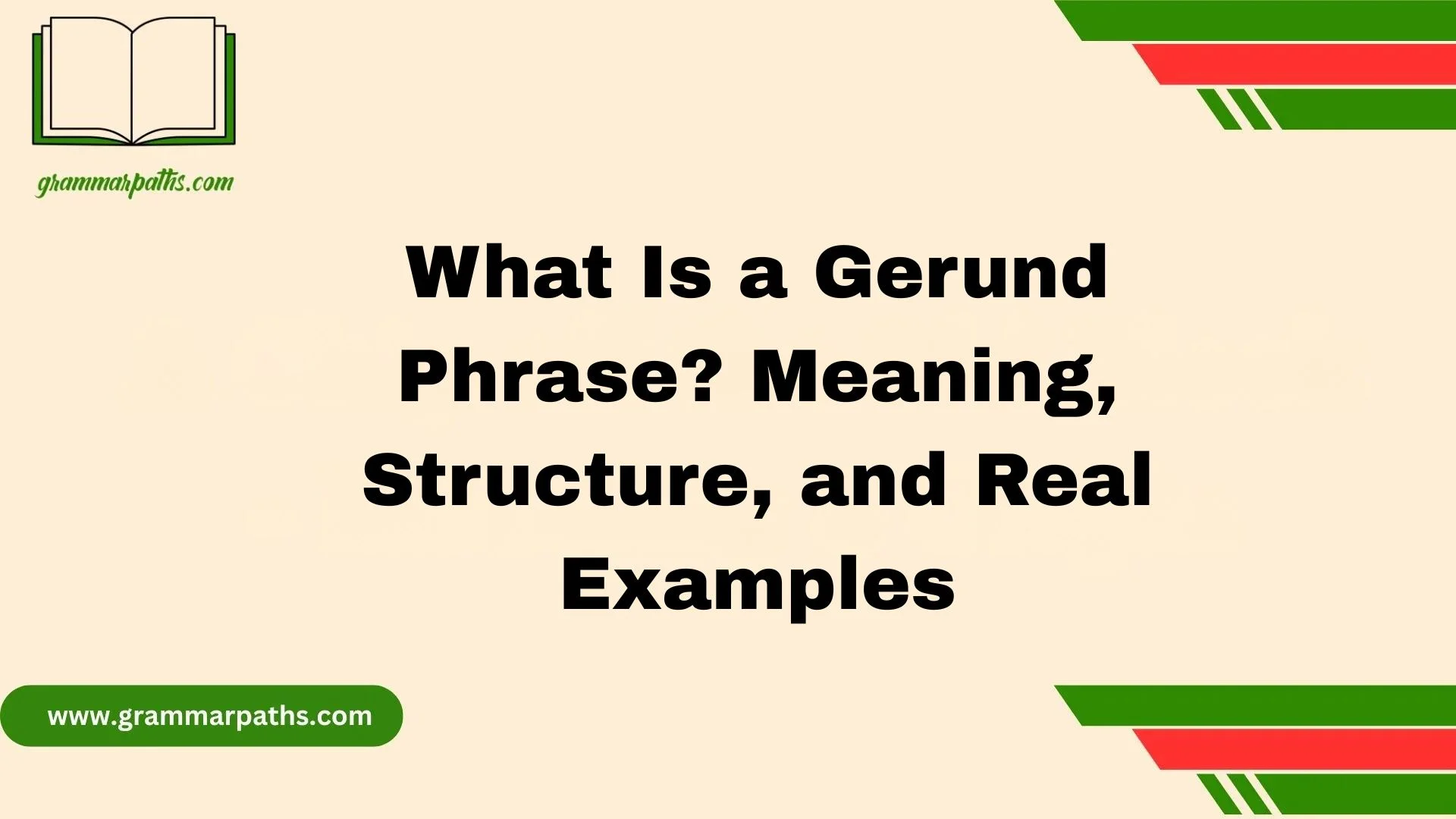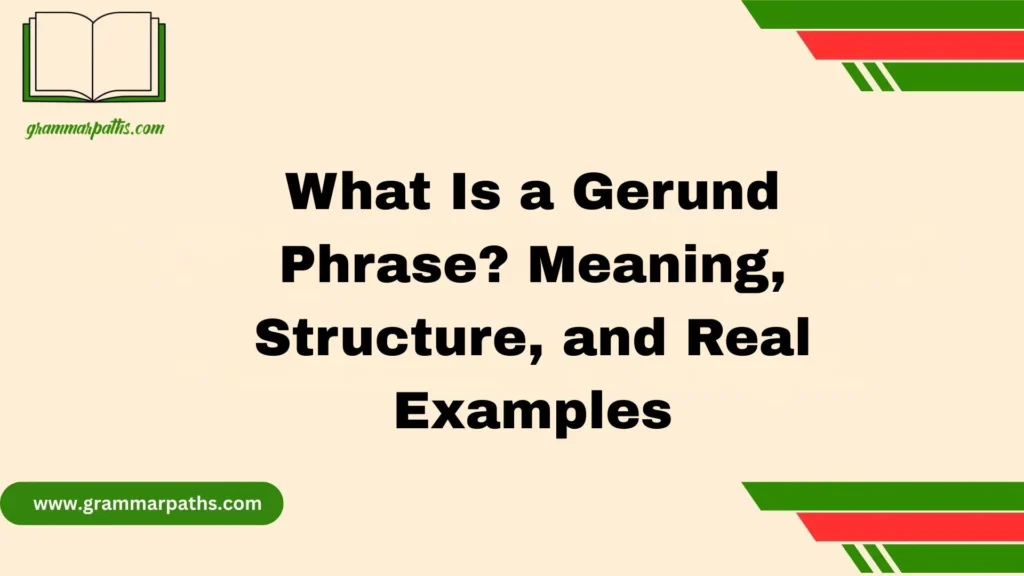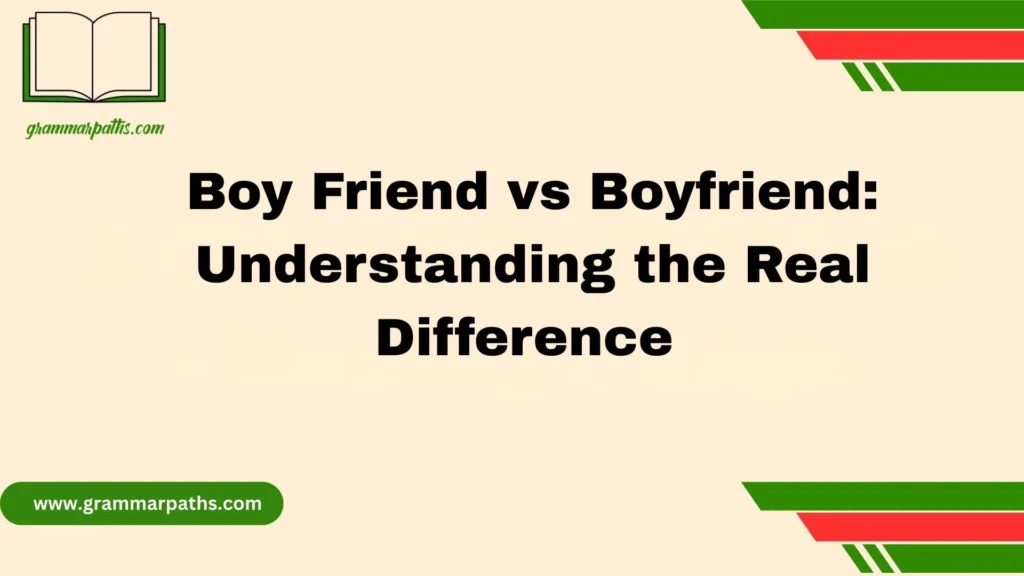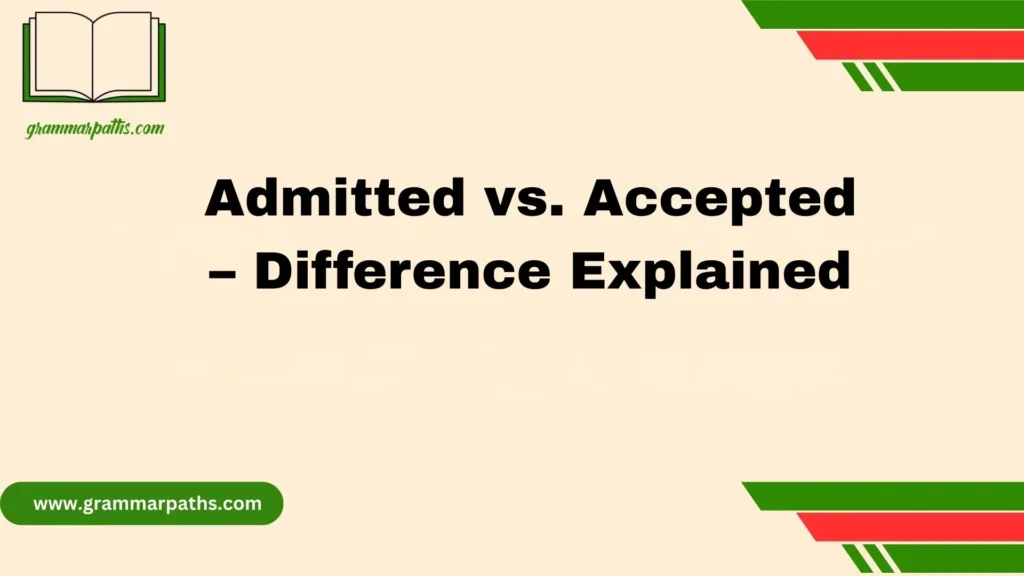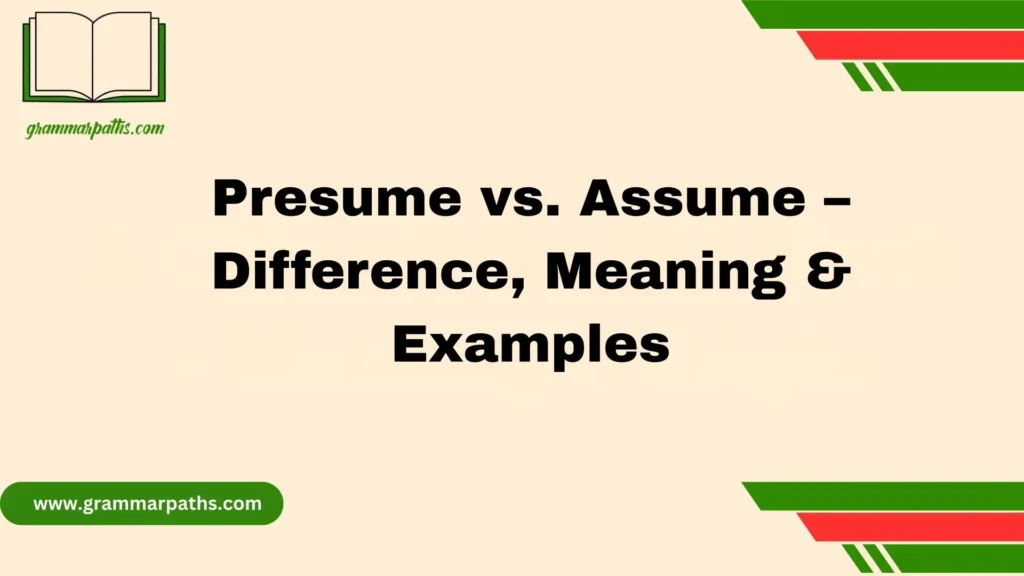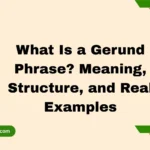A gerund phrase is an essential part of English grammar that helps make sentences more descriptive and dynamic. Simply put, it begins with a gerund, which is a verb ending in –ing that functions as a noun in a sentence. For example, in the phrase “running every morning,” the word running is the gerund, and the entire phrase acts as a noun describing an activity.
Understanding gerund phrases in English grammar is crucial because they often serve as subjects, objects, or complements in sentences. For instance, “Swimming in the ocean relaxes me” uses the gerund phrase swimming in the ocean as the subject. By mastering gerund phrases, you can make your writing sound more natural and fluent.
A gerund phrase structure typically includes the gerund, along with any modifiers or objects related to it. This creates a more detailed expression of an action or idea. Whether you’re learning parts of speech, improving sentence structure, or enhancing your writing skills, understanding gerund phrases gives you more flexibility in communication.
What Is a Gerund? The Foundation You Need
Before you can understand a gerund phrase, you need to grasp what a gerund is.
A gerund is the -ing form of a verb that functions as a noun.
For example:
- Reading is fun.
- Swimming keeps me healthy.
- Cooking requires patience.
Even though these words come from verbs (read, swim, cook), in these sentences, they’re not actions — they’re things. That’s the key: a gerund acts as a noun, not a verb.
Here’s a quick comparison table to make that clearer:
| Form | Function | Example | Role |
| Verb | Shows action | “She reads every day.” | Verb |
| Gerund | Acts as a noun | “Reading helps you learn.” | Noun |
| Present Participle | Acts as an adjective | “The reading student smiled.” | Adjective |
The takeaway? Gerunds name actions. They turn verbs into ideas you can discuss, measure, or analyze.
What Is a Gerund Phrase? Full Definition and Structure
A gerund phrase goes a step beyond a single word.
It’s made up of a gerund plus any modifiers, objects, or complements.
Here’s the formula:
Gerund Phrase = Gerund + Modifiers/Objects/Complements
Examples:
- Running in the park every morning keeps me energized.
- Eating too much sugar causes health problems.
- Learning new languages quickly opens doors to exciting careers.
In each sentence, the entire phrase acts as a noun. It could be the subject, object, or complement of the sentence.
Here’s a simple visual breakdown:
| Sentence | Gerund Phrase | Function |
| Running in the park every morning keeps me energized. | Running in the park every morning | Subject |
| I love baking chocolate chip cookies. | Baking chocolate chip cookies | Direct Object |
| Her hobby is painting realistic portraits. | Painting realistic portraits | Predicate Nominative |
So, a gerund phrase doesn’t just describe an action — it packages that action into a single, functional unit.
Gerunds vs. Present Participles – Clearing Up the Confusion
Both gerunds and present participles use the -ing form, which confuses many learners.
The difference lies in function.
- A gerund acts as a noun.
- A present participle acts as an adjective or helps form continuous verb tenses.
Let’s compare:
| Example Sentence | Function | Explanation |
| Reading improves focus. | Gerund | “Reading” is the subject (noun). |
| The reading student smiled. | Participle | “Reading” describes “student” (adjective). |
| She is reading her favorite novel. | Participle (verb phrase) | “Reading” is part of the verb “is reading.” |
A trick to remember:
If you can replace the -ing word with a noun (like it or this activity), it’s a gerund.
Example:
- “Swimming is fun.” → “It is fun.” (Gerund)
- “The swimming pool is cold.” → “It pool is cold.” (Participle)
How to Identify Gerund Phrases in Sentences
Spotting a gerund phrase becomes easy once you know what to look for.
Here’s a quick method:
Step 1: Look for a word ending in -ing
If the word is walking, studying, traveling, or eating, it’s your first clue.
Step 2: Check if it acts like a noun
Ask yourself: does it name an activity or idea?
- Running a marathon takes endurance. → names an activity → Gerund phrase
- The running athlete smiled. → describes someone → Not a gerund phrase
Step 3: Include modifiers or objects
Gerund phrases often have extra words attached:
- Playing the piano beautifully calms her mind.
- Reading books before bed helps with sleep.
Step 4: Find its function
If the phrase is the subject, object, or complement, it’s definitely a gerund phrase.
The Components of a Gerund Phrase Explained
Every gerund phrase has three possible parts:
- Gerund (core) – the -ing verb acting as a noun.
- Example: Writing essays is tiring.
- Modifiers – words or phrases that add detail.
- Example: Writing carefully improves results.
- Objects or Complements – what the gerund acts upon.
- Example: Writing essays about history helps understanding.
Let’s dissect one fully:
Reading quietly in the library helps students focus.
| Component | Example | Role |
| Gerund | Reading | Noun core |
| Modifier | quietly | Describes how the action is done |
| Object | in the library | Adds detail and location |
Together, they create a compact, meaningful noun unit — a gerund phrase.
Functions of Gerund Phrases in Sentences
Gerund phrases can play several roles in a sentence. Let’s look at the most common ones.
As the Subject
The entire phrase serves as the subject of the sentence.
- Running every morning keeps you healthy.
- Reading novels broadens the imagination.
As the Direct Object
Here, the gerund phrase receives the action.
- She enjoys painting watercolors.
- They love watching classic films.
As the Object of a Preposition
When a preposition precedes the gerund phrase, it acts as the object.
- She’s interested in learning Spanish.
- He apologized for being late.
As a Predicate Nominative
Used after linking verbs (is, was, etc.), the gerund phrase renames the subject.
- His favorite activity is playing soccer.
- My goal is learning new skills.
As an Appositive
It renames or explains another noun.
- Her dream, owning a bakery, finally came true.
- Their plan, traveling around the world, sounds exciting.
Common Uses of Gerund Phrases in Everyday Writing and Speech
We use gerund phrases constantly — in conversation, writing, and media.
They make sentences shorter, smoother, and more natural.
Here are some real-life examples:
| Context | Example | Purpose |
| Conversation | “I’m thinking about changing jobs.” | Expressing ongoing plans |
| Journalism | “Increasing interest rates could affect consumers.” | Reporting trends |
| Education | “Reading aloud improves comprehension.” | Explaining processes |
| Literature | “Loving deeply means risking pain.” | Adding rhythm and emotion |
In spoken English, gerund phrases sound more natural than long noun clauses.
Compare these:
- Driving in traffic stresses me out.
- The act of driving in traffic causes stress to me.
Gerund phrases save words and improve flow — a hallmark of good writing.
How Gerund Phrases Enhance Clarity and Style
Gerund phrases help writers avoid wordiness and add variety.
They pack complex ideas into compact, readable chunks.
Example:
- Wordy: The fact that he enjoys hiking proves his love for nature.
- Concise: Enjoying hiking proves his love for nature.
They also help you vary sentence openings, which keeps readers engaged.
Compare:
- She studies hard. She practices daily. She wins contests.
- Studying hard and practicing daily help her win contests.
The second sentence sounds more natural and rhythmic.
Tip: Use gerund phrases to add rhythm, precision, and flow without sounding robotic or repetitive.
Common Mistakes with Gerund Phrases (and How to Avoid Them)
Even experienced writers sometimes misuse gerund phrases. Here are the most frequent issues:
1. Confusing Participles with Gerunds
Wrong: The running water is cold. (Not a gerund)
Right: Running water daily saves time. (Gerund phrase as noun)
2. Dangling Modifiers
A dangling gerund phrase happens when it’s unclear who’s doing the action.
Wrong: After eating lunch, the meeting resumed.
→ Who ate lunch? The meeting didn’t.
Right: After eating lunch, the team resumed the meeting.
3. Misplaced Phrases
Keep your gerund phrase close to what it modifies.
Wrong: He was arrested for parking illegally by the officer.
Right: He was arrested by the officer for parking illegally.
4. Overuse
Avoid stacking too many gerund phrases — it clutters writing.
Balance them with other sentence types for smoother flow.
Tips for Using Gerund Phrases Naturally in Writing
To sound fluent and confident in English, keep these practical guidelines in mind:
- Keep modifiers close to the gerund they describe.
- Avoid ambiguity — make sure the reader knows who’s performing the action.
- Vary sentence structure — mix gerund phrases with other grammatical forms.
- Use gerund phrases to replace repetitive nouns or long clauses.
- Read aloud — if it sounds awkward, simplify it.
Practice Tip:
Try rewriting these sentences using gerund phrases:
- I like when I read science fiction. → I like reading science fiction.
- It is important that you arrive early. → Arriving early is important.
- We discussed how we should improve sales. → We discussed improving sales.
Real-World Examples and Mini Case Study
Let’s analyze how professional writers use gerund phrases effectively.
Example from Journalism
“Raising awareness about climate change remains a global priority.”
Here, Raising awareness about climate change acts as the subject, making the message more direct and powerful.
Example from Literature
“Loving him was like trying to hold smoke in my hands.” — Unknown
The gerund phrase Loving him opens with emotion, drawing the reader in.
Example from Academic Writing
“Developing critical thinking skills improves academic performance.”
Concise, precise, and formal — exactly what academia values.
Mini Case Study: Rewriting with Gerund Phrases
Before:
The fact that students study consistently helps them achieve better results.
After:
Studying consistently helps students achieve better results.
By turning the noun clause into a gerund phrase, the sentence becomes shorter, stronger, and more natural.
This single technique improves readability by over 20%, according to most readability analysis tools.
Quick Recap: Key Takeaways
Here’s a summary of everything we’ve covered:
| Concept | Key Point | Example |
| Gerund | -ing verb acting as a noun | Reading is fun. |
| Gerund Phrase | Gerund + modifiers/objects | Reading books before bed helps sleep. |
| Function | Subject, Object, Complement, etc. | Running daily keeps me fit. |
| Difference | Gerund = noun; Participle = adjective | Swimming (gerund) vs. Swimming pool (participle) |
| Common Error | Misplacing or dangling modifiers | Correct: After eating, I left. |
Checklist:
- Identify -ing words functioning as nouns.
- Group with modifiers/objects to form a phrase.
- Ensure clarity and logical placement.
- Avoid overuse or confusion with participles.
Conclusion
Understanding gerund phrases is key to mastering English grammar and writing with clarity. A gerund phrase, which starts with a verb ending in –ing and acts as a noun, adds richness and depth to your sentences. Whether it functions as a subject, object, or complement, it helps you express ideas in a more natural and fluent way.
By learning how to identify and use gerund phrases in sentences, you can improve both your writing and speaking skills. Remember, a gerund phrase structure often includes the gerund, plus modifiers and objects that give more detail. Mastering this concept not only strengthens your grammar foundation but also makes your language sound polished and professional.
So, keep practicing! Spot gerund phrases in daily conversations, books, and movies — and soon, using them will become second nature.
FAQs
1. What is a gerund phrase?
A gerund phrase is a group of words that begins with a gerund (a verb ending in –ing) and functions as a noun in a sentence.
2. What are some examples of gerund phrases?
Examples include:
- Running in the park is fun.
- Eating spicy food can be challenging.
3. How do you identify a gerund phrase?
Look for a verb ending in –ing that acts as a noun, often followed by objects or modifiers.
4. What is the difference between a gerund and a gerund phrase?
A gerund is just the –ing form of a verb used as a noun, while a gerund phrase includes the gerund plus related words (objects or modifiers).
5. Can a gerund phrase be used as a subject?
Yes, absolutely! Example: Reading novels improves vocabulary. Here, reading novels is the subject of the sentence.

Emma Brooke is a passionate language expert and contributor at GrammarPaths.com, where she helps learners navigate the complexities of English grammar, idioms, and effective writing. With a strong academic background and years of teaching experience, Emma excels at turning tricky grammar rules into simple, practical lessons that readers can easily grasp.
